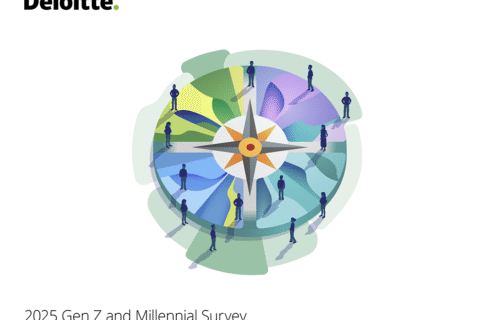Deloitte’s latest Gen Z and Millennial Survey 2025, based on responses from over 23,000 participants across 44 countries, highlights how younger generations are reshaping the modern workplace. Together expected to comprise nearly 74% of the global workforce by 2030, Gen Z and millennials are redefining what success and satisfaction mean — prioritizing learning, purpose, and well-being over traditional corporate advancement.
The study finds that only 6% of Gen Zs see senior leadership roles as their main career goal, yet 70% are actively developing career skills weekly. Learning and development rank among their top three reasons for choosing an employer, underscoring their emphasis on personal growth over hierarchy. However, many respondents feel that managers focus too much on day-to-day supervision rather than mentorship and long-term development.
Financial pressures are also shaping attitudes. Nearly half of Gen Zs (48%) and millennials (46%) report feeling financially insecure, with over 50% living paycheck to paycheck. The cost of living remains the top concern for the fourth consecutive year, followed by mental health and job stability. Despite this, more than a third of both groups have side jobs, driven not only by necessity but also by a desire to gain new skills and independence.
The survey identifies a key formula for workplace happiness — the balance of money, meaning, and well-being. Financial security strongly correlates with happiness: 60% of financially secure Gen Zs say they feel happy, compared with only 28% among those who do not. Purpose-driven work is another major factor, with 89% of Gen Zs and 92% of millennials saying that meaningful work is essential to job satisfaction. Yet about 40% admit they have left a job that lacked purpose.
Technology is also driving transformation. Over 56% of respondents already use Generative AI (GenAI) at work, primarily for data analysis, creative work, and project management. While many say it improves efficiency and work/life balance, around two-thirds worry it could eliminate jobs or limit entry-level opportunities. Despite these concerns, most see AI training and soft skills — such as empathy, leadership, and adaptability — as critical for long-term success.
Mental health remains a significant challenge. Only 52% of Gen Zs and 58% of millennials rate their mental well-being as good or very good, and about one-third say work is a major source of stress. Respondents called for better recognition, fairer workloads, and more supportive leadership to address workplace anxiety.
Environmental and ethical considerations also play a role in decision-making: nearly two-thirds are willing to pay more for sustainable products, and about one in four say they researched a company’s environmental policies before accepting a job offer.
Overall, Deloitte’s 2025 findings depict a generation seeking careers defined not by titles but by purpose, balance, and continuous learning — and urging employers to adapt. The report concludes that businesses able to deliver on these expectations will not only attract but also retain the talent shaping the future global workforce.
Source: Deloitte
